新外研版八年级英语下册Module2 Unit3Language in use精品课件(共53张PPT)
外研版八下英语Module 2 Experiences Unit 3 Language in use

what's more 而且;另外 表示递进,其后通常加逗号。You're wrong, and what's more, you know it!你错了,而且你明明知道你错了!
指"发现,找到",强调找的结果。
look for
指"寻找",强调找的动作,不一定能找到。
语境串记My mobile phone is lost. I have looked for it everywhere, but I can't find it. Could you help me to find out where it is? 我的手机丢了,我到处找,但是没找到。你能帮我查明它在哪里吗?
Call today to find out more!今天打电话来了解更多信息!(教材P16)
find out 查明,弄清 find out, find与look for
find out
指"查明,弄清",强调通过观察、探索等发现事情的真相。
find
Do you love nature and want to keep forests safe?你热爱大自然并想保护森林安全吗?(教材P16)
ห้องสมุดไป่ตู้keep+宾语+adj. 使……保持某种状态
该结构中,形容词作宾语补足语,说明宾语所处的状态。有类似用法的动词还有make、find等。Rules and laws keep everyone safe. 规则和法律保证每个人的安全。I really want to make things easier for people, especially the old. 我真的想让人们的生活更轻松,尤其是老年人。(安徽中考)
外研版英语八年级下册教案:Module2ExperiencesUnit3Languageinuse

此外,实践活动中的写作练习,让我看到学生们在句子结构和篇章组织上的不足。这说明我们在今后的教学中,除了关注语法和词汇,还要加强写作技巧的培养。通过提供更多写作框架和示例,帮助他们构建更清晰、连贯的篇章。
外研版英语八年级下册教案:Module2 Experiences Unit 3 Language in use
一、教学内容
外研版英语八年级下册教案:Module 2 Experiences Unit 3 Language in use
本节课我们将学习Unit 3 Language in use,该章节内容主要包括以下部分:
1.正确运用一般过去时态描述过去的具体事件。
2.能够在实际对话中灵活使用与旅游和参观相关的词汇。
3.将语法结构与实际情境结合,进行准确的书面表达。
**教学重点:**
1.理解和掌握一般过去时态的构成和过语言实践,将所学知识应用于实际交流中。
**针对难点3:**
-创设情境,如模拟旅游访谈或写旅游日记,让学生在实际情境中练习书面表达。
-提供写作框架和指导,帮助学生构建句子和篇章结构。
四、教学流程
(一)导入新课(5分钟)
同学们,今天我们将要学习的是Module 2 Experiences中的Unit 3 Language in use。在开始之前,我想先问大家一个问题:“你们在假期中有没有去过特别的地方旅游?”这个问题与我们将要学习的内容密切相关。通过这个问题,我希望能够引起大家的兴趣和好奇心,让我们一同探索如何用英语描述我们的旅游经历。
初中英语外研社八年级下Module 2 Unit 3

现在完成时态的句子转换
(1)肯定式:They have just finished their
homework.
否定式:They haven’t finished their
homework yet.
疑问式:Have they finished their
homework yet?
简略答语:Yes, they have. / No, they haven’t.
句型转换。
即学即练
1.They have been to Mars.
They haven’t been to Mars. 否定句:_____________________________________
一般疑问句:__________________________________ Have they been to Mars?
肯定回答:__________________________________ Yes, it has.
否定回答:__________________________________ No, it hasn’t.
Why has the spacecraft 特殊疑问句(Why):__________________________
现在完成时
用法
1.表示曾经做过某事 或已经做过某事 2. 表示某人的经历
常用状语
ever, already, yet
现在完成时的结构: has/have +动词过去分词
肯定句 I have worked. He/She has worked. They have worked. 否定句 I have not worked. He/She has not worked. They have not worked.
初中英语外研版八年级下册《Module 2 Experiences Unit 3 Language
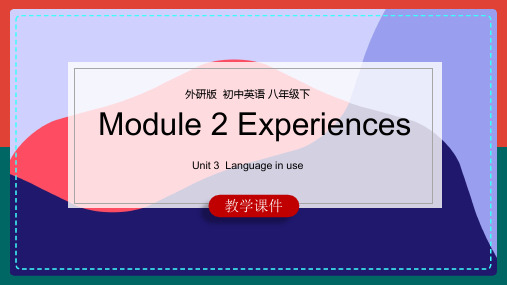
2) live in another city Have you ever lived in another city?
3) enter a singing competition Have you ever entered a singing competition?
4) travel by train Have you ever travelled by train?
1. The car is too expensive. I can’t a____ it.
2. I can’t afford ___(buy ) a car now.
1. 不要编造借口了。 你总是上学迟到。 Don’t _______ ________ an excuse. You always come late to school. 2. 十一个人组成一支足球队。
2. I often ______my friends ____my home.
我常常邀请朋友们到我家。
1. Kate is __________ girl. She’s very happy at school. A. a eighteen-year-old B. an eighteen-year-old C. an eighteen-years-old D. a eighteen-years-old
支付得起做某事
afford to do sth.
真惋惜 编造;组成,构成
That’s a pity! make up
邀请某人做某事
invite sb. to do sth.
一个十五岁的美国男孩 a fifteen-year-old American boy
最大最繁华的城市之一
外研版八年级英语下册Module 2Unit 3 Language in use 教案
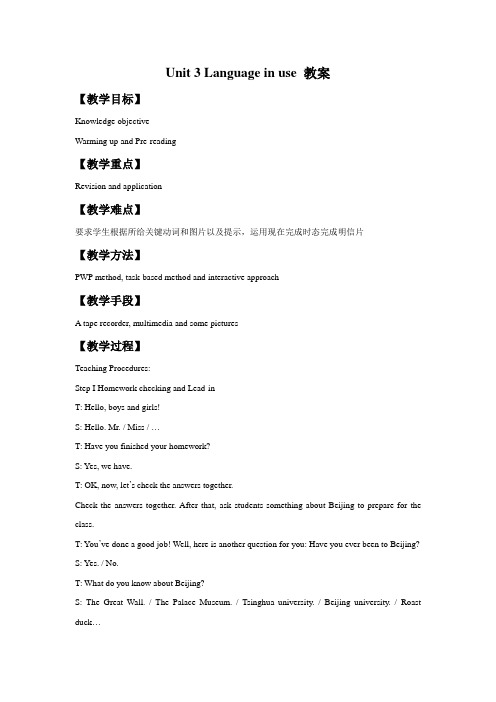
Unit 3 Language in use 教案【教学目标】Knowledge objectiveWarming up and Pre-reading【教学重点】Revision and application【教学难点】要求学生根据所给关键动词和图片以及提示,运用现在完成时态完成明信片【教学方法】PWP method, task-based method and interactive approach【教学手段】A tape recorder, multimedia and some pictures【教学过程】Teaching Procedures:Step I Homework checking and Lead-inT: Hello, boys and girls!S: Hello. Mr. / Miss / …T: Have you finished your homework?S: Yes, we have.T: OK, now, let’s check the answers together.Check the answers together. After that, ask students something about Beijing to prepare for the class.T: You’ve done a good job! Well, here is another question for you: Have you ever been to Beijing? S: Yes. / No.T: What do you know about Beijing?S: The Great Wall. / The Palace Museum. / Tsinghua university. / Beijing university. / Roast duck…T: Great!Step II Speaking and writingActivities 1-4 help students use and review what they have learned about experience and the present perfect tense.1. Get the students to do Activities 1 & 2T: Since you have known Beijing better, I think it will be a piece of cake for you, right?S: Yes!T: OK. Next, do Activity 1 on your own and Activity 2 with your partner. Clear?S: Yes!Give students enough time to do the two Activities. Walk around; give them a hand if necessary. After that, ask some of the students to read their writings, and after class put up the excellent ones. And then ask some pairs to show their dialogues.2. Get the students to do Activities 3-4Before students do this, ask them to pay more attention to the past participle forms of these words. After they finished doing that, ask some of them to show their dialogues.Sample dialogue:A. Have you ever had a western meal?B: Yes, I have. Have you ever lived in another country?A: No, I haven’t.Get students to do Activity 8 on page 16 which help students practice talking about their own and other s’ experience.。
外研版英语八年级下册:Module 2 Unit 3 Language in use . 课程教学设

八年级外研版Module 2 Experiences展示课教学设计Showing experiences and learning from them一、教学内容分析本节课内容是Module2的一节展示课,紧紧围绕说经历、听经历、收获经历的话题展开。
在第一、第二单元话题语境的基础上,进一步激活学生对经历话题的兴趣,从而深度理解经历对一个人成长的重要性。
本单元训练的语法功能项目是能够运用现在完成时态询问、介绍以及收获经历。
本课突出文化与知识、情感的结合,侧重培养学生的表达与展示技能,训练学生熟练运用所学的语法功能用语去表达和展示所说话题,学生通过询问、聆听了解他人的经历并表述自己的经历,从中感悟,达到培养学生独立、自立的意识和对家乡祖国的热爱之情的目的。
二、学情分析本课授课对象是八年级学生,他们已经有着初步的人生经历,对话题充满兴趣,并且在第一、第二单元已经探讨过经历的有关话题。
我充分利用这些话题,采取步步追问的方式,进一步探讨话题,调动学生参与活动的积极性,从而让学生在经历中感悟人生,学习文化,达到提高学生综合运用语言的能力。
三、教学目标1. 语言知识目标⑴词汇和短语:展示使用本模块的基本词汇ever,enter, competition等(2)语法:能够运用现在完成时态询问、介绍以及收获经历。
2. 语言技能与学习策略目标(1) 能通过询问用现在完成时回答(2)能通过聆听获取主要信息(3) 能借助语义结构图复述转述课文(4)能流畅地表述自己的经历、收获他人的经历3. 情感态度与文化意识目标通过合作学习,展示、了解并深度理解经历对一个人成长的重要性四、教学流程活动(一):复习第一、第二单元,初步展示,激活情趣Teacher leads the students to revise Unit One by asking the following:1.What have we talked about Module Two ?2. In Unit One, whose experiences did you learn about?3. Who would like to say something about lingling ?4. Lingling has never won any prizes, but she is still entering anothercompetition,why?5. Have you ever entered any competitions? What kind?6. Have you got any prizes?7. If you are Lingling, what are you going to do?8.What about Tony? If you were Tony, would you stop trying? Why?【设计意图】: 通过语义结构图和问题的介入,导入话题,引出本课的内容, 让学生与老师对话,步步追问,充分、深层次地展示所学语言知识,同时,挖掘思想内涵,实现情感目标和价值观的展现。
外研版英语八年级下册Module 2Unit 3 Language in use 教案3
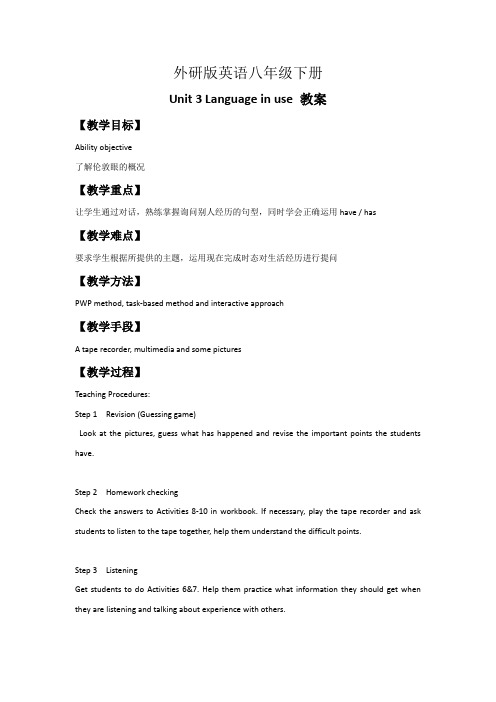
外研版英语八年级下册Unit 3 Language in use 教案【教学目标】Ability objective了解伦敦眼的概况【教学重点】让学生通过对话,熟练掌握询问别人经历的句型,同时学会正确运用have / has【教学难点】要求学生根据所提供的主题,运用现在完成时态对生活经历进行提问【教学方法】PWP method, task-based method and interactive approach【教学手段】A tape recorder, multimedia and some pictures【教学过程】Teaching Procedures:Step 1 Revision (Guessing game)Look at the pictures, guess what has happened and revise the important points the students have.Step 2 Homework checkingCheck the answers to Activities 8-10 in workbook. If necessary, play the tape recorder and ask students to listen to the tape together, help them understand the difficult points.Step 3 ListeningGet students to do Activities 6&7. Help them practice what information they should get when they are listening and talking about experience with others.Step 4 introduction伦敦眼(The London Eye)英航伦敦眼(The British Airways London Eye) 构成了伦敦天际一道亮丽的风景线。
外研版英语八年级下册Module2Unit3Language in use (共15张PPT)
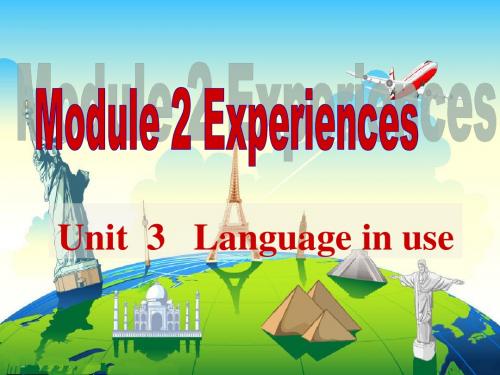
Tony hasn’t seen the film.
P 14—3 Complete the sentences.
Work in pairs. Ask and answer questions.
Have you ever climbed the Great Wall?
the Great Wall
roast duck
in Egypt
seeing the world learn language
plan
work back
Have you ever…? Yes , I have . / No , I haven’t.
Write questions for the questionnaire with “Have you ever…?”; then ask and answerP14-1 You Your Activities partner
first prize: dream holiday
Tony
“Around the World in 80 Days”
enter lots of speaking competitions
hasn’t won any prize
Writing competition
make it up
write a story about a place…
外研版八年级下 Module 2 Unit 3 Language in use
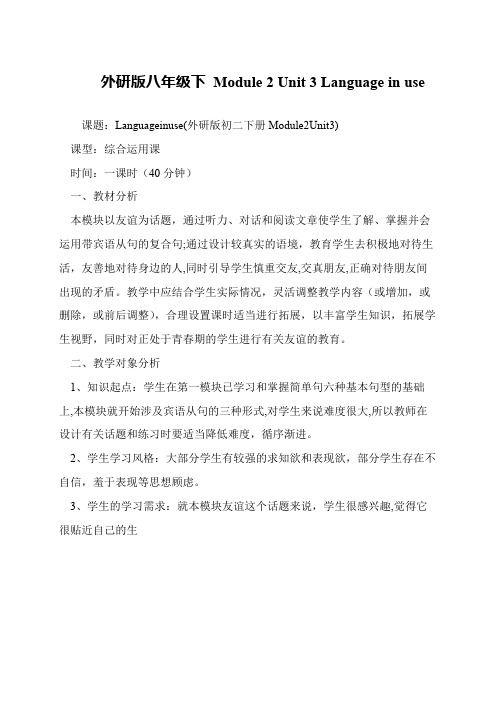
外研版八年级下Module 2 Unit 3 Language in use
课题:Languageinuse(外研版初二下册Module2Unit3)
课型:综合运用课
时间:一课时(40分钟)
一、教材分析
本模块以友谊为话题,通过听力、对话和阅读文章使学生了解、掌握并会运用带宾语从句的复合句;通过设计较真实的语境,教育学生去积极地对待生活,友善地对待身边的人,同时引导学生慎重交友,交真朋友,正确对待朋友间出现的矛盾。
教学中应结合学生实际情况,灵活调整教学内容(或增加,或删除,或前后调整),合理设置课时适当进行拓展,以丰富学生知识,拓展学生视野,同时对正处于青春期的学生进行有关友谊的教育。
二、教学对象分析
1、知识起点:学生在第一模块已学习和掌握简单句六种基本句型的基础上,本模块就开始涉及宾语从句的三种形式,对学生来说难度很大,所以教师在设计有关话题和练习时要适当降低难度,循序渐进。
2、学生学习风格:大部分学生有较强的求知欲和表现欲,部分学生存在不自信,羞于表现等思想顾虑。
3、学生的学习需求:就本模块友谊这个话题来说,学生很感兴趣,觉得它很贴近自己的生。
外研版初中英语八下Module 2 Unit 3 Language in use 课件
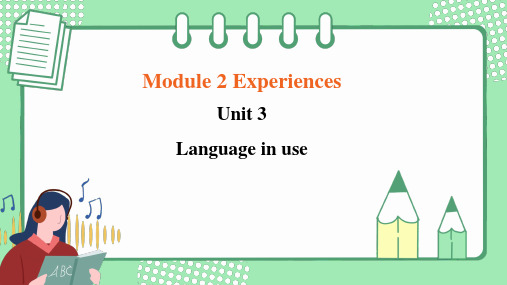
stop → stopped→stopped
Tasks
Task 1 Write questions for the questionnaire with Have you ever...?
1. have a Western meal 2. live n another city 3. enter a singing competition 4. travel by train 5. travel to the seaside 6. try seafood 7. cook dinner for your parents
1. had a Western meal?
2. lived in another city?
Have you ever…….
3. entered a singing competition?
Yes, I have. / No, I haven’t.
4. travelled by train? 5. travelled to the seaside? 6. tried seafood?
The Grow-a-Forest gift is part of an exciting plan to make our world greener, and every gift helps to protect our world. It is easy! Buy a Grow-a-Forest gift today and choose your forest and
外研版英语八年级下册课件Module 2 Unit 3 language in use (共20张PPT)

动词的过去分词变化规律: ed (1)规则变化:一般情况下在动词后加__________; d 在e结尾的动词后只加__________ 以辅音字母+y结尾的动词,变 y 为______, 再加ed; i 以重读闭音节结尾的动词,如果末尾只有一个辅音字母, 应________ 双写 这个辅音字母再加ed (2)大部分动词过去分词的变化形式与动词过去式形式 相同,但是有一部分动词的变化是不规则的,没有规律, 需要记忆,本模块中出现的有: won think-_____ thought send -_____ sent win-_____ learnt see-_____ seen have -_____ had learn -_____
Today we're talking to Winnie,Diana and Bob about their travel __________. Winnie has been to the US______ times,but Diana has ____been to the US,she has been to China many times by _______.Bob now lives in _______,he has never been to the US ______.
3. The Robinsons love seeing the world .They __________many interesting places._____,in Egypt, they _________ the Pyramids,_______________on the Nile River,and visited the palaces and towers of ______________. 4. Mlike and Clare ___________the language of the country ,Arabic .The language ____________ English _____________.and they find _________________the words .However ,they still enjoy learning it .______they ____________German,French,Chinese and Arabic .Sometimes they mix the laguages .
外研版八年级英语下册Module 2 Experiences Unit3 Language in u
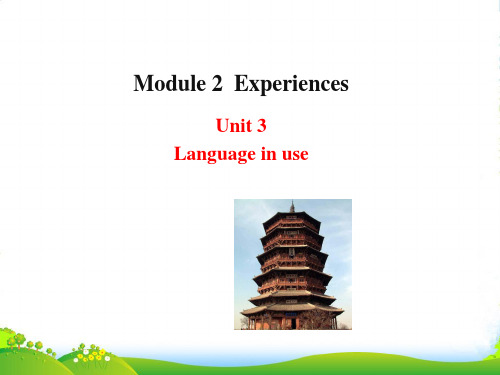
you ever…?
Write a questionnaire about your experiences.
Have you ever …
had a Western meal? lived in another city? entered a singing competition? travelled by train? travelled to the seaside? tried seafood? cooked dinner for your parents?
Roast duck
not eat; roast duck
The boy _h_a_s_n_’_t_e_a_te_n__B_e_i_ji_n_g__ro_a_s_t_d_u__ck_____.
the Great Wall He has climbed the Great Wall .
Revision
Hale Waihona Puke PresentationGrammar
现在完成时
如果你想说“我已经看过某部电影,所以不想 看了” “某人曾经做过什么事情”等等,该如 何表达呢?首先请看下面的句子:
(1)I have seen the film. I don’t want to see it again.
(2) Have you ever read a travel brochure?
Complete the sentences with the words in the box.
afford, competition, pronounce, spell, tower 1.I wrote a story for a(n) _c_o_m__p_e_ti_ti_o_n_ in my English class and I won a prize. 2.Alice can __s_p_e_ll__ very well, and what's more, she can write beautifully. 3.Some English words are difficult to __p_r_o_n_o_u_n_c_e__. 4.We visited an ancient palace with a tall _t_o_w_e_r__ and a beautiful garden. 5.Mary wants to visit the US, but the plane tickets are very expensive and she cannot _a_ff_o_r_d_ to go.
外研版初中英语八年级下册Module 2 《Unit 3 Language in use》课件共64页

3. They have been to many interesting places.
4. I’ve always wanted to go on a dream holiday.
5. I’ve also entered lots of speaking competitions, but haven’t won any prizes.
it.
(2019河北)
A. don’t watch B. won’t watch
C. haven’t watched D. wasn’t watching
7. — Is James at home?
— No, he _________ Ya’an to be a
volunteer.
(2019福建福州)
The following examples are from the texts of this module. Now let’s observe them carefully.
1. Have you ever won any prizes before?
2. I’ve never travelled a lot.
C. has read
D. would read
13. — My car _____. Could you please give
me a ride tomorrow?
—I’m sorry I can’t. I’m_____ London
tomorrow morning. (2019山东青岛)
A. is new, leaving
4. Since 2000, Jingmen has become a new
city. Everything _________.
外研版初中英语八年级下册Module 2 Unit 3 Language in use-课件 共64页

A. has gone to B. has been to
C. is going to
8. — Hello, may I speak to Miss Wang?
— Sorry, she isn’t in. She ________ the
office.
(2019四川南充)
A. has been to B. has gone to
done…
No, we have not
(haven’t).
人称 肯定句 否定句 疑问句及回答
He/She has done…
第三 人称 They
have done…
He/She has Has he/she done…?
not (hasn’t) Yes, he/s not
A. has been
B. has gone
C. goes
D. will go
3. Julia isn’t going to the cinema with us
because she _________ the film.
(2019 浙江湖州 )
A. sees
B. saw
C. will see
D. has seen
10. I’ve stopped trying now.
1. to test your sense of observation 2. to test your ability of short-term memory 3. to test your ability of inductive method
10. I h_a_v_e_ _s_to_p_p_e_d_ (stop) trying now.
外研版英语课件八下m2unit3languageinuse

Complete the postcard
• things that Rob has done He has climbed the Great Wall. He has visited the Palace Museum. He has eaten Beijing Duck.
• One thing that Rob hasn’t done He hasn’t visited the Summer Palace.
• Introduce one of your classmates’ experience according to your questionnaire.
• Try to use the present tense properly and correctly.
1. have a Western meal 2. live in another city 3. enter a singing competition 4. travel by train 5. travel to the seaside 6. try seafood 7. cook dinner for your parents
• Sometimes, they ________7____them when they speak. But they enjoy learning languages think it’s really ___8____. The Robinsons are moving again. They will go back to America because of Mr Robinson’s job. Mike and Clare are happy about this because they miss their friends in the US very much. They are ____9_______the days.
外研版英语八年级下册:Module 2 Unit 3 Language in use . 教案设计
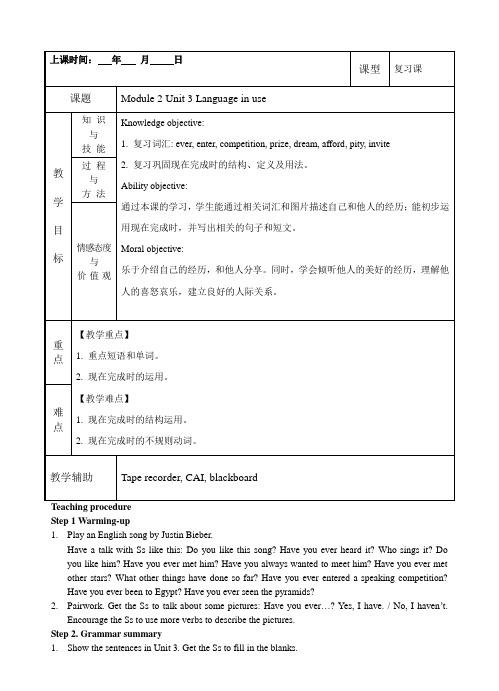
Teaching procedureStep 1 Warming-up1.Play an English song by Justin Bieber.Have a talk with Ss like this: Do you like this song? Have you ever heard it? Who sings it? Do you like him? Have you ever met him? Have you always wanted to meet him? Have you ever met other stars? What other things have done so far? Have you ever entered a speaking competition?Have you ever been to Egypt? Have you ever seen the pyramids?2.Pairwork. Get the Ss to talk about some pictures: Have you ever…? Yes, I have. / No, I haven’t.Encourage the Ss to use more verbs to describe the pictures.Step 2. Grammar summary1.Show the sentences in Unit 3. Get the Ss to fill in the blanks.2.Ask Ss to summarize the Grammar.Step 3 Write questions for the questionnaire with Have you ever…?Look at the pictures and make sentences with “Have you ever…?”.1) have a Western meal Have you ever had a Western meal?2) live in another city Have you ever lived in another city?3) enter a singing competition Have you ever entered a singing competition?4) travel by train Have you ever travelled by train?5) travel to the seaside Have you ever travelled to the seaside?6) try seafood Have you ever tried seafood?7) cook dinner for your parents Have you ever cooked dinner for your parents?Step 4 Complete the questionnaire with the questions and answer the You column.Complete the questionnaire.Answer the You column in groups.Step 5 Work in pairs. Ask and answer the questions in the questionnaire. Then complete the Your partner column.Ask and answer the questions in the questionnaire in pairs.Complete the Your partner column.Choose one group to show their answers.Step 6 Complete the sentences about your partner and report them to the rest of the class.Complete the sentences with have/has +p.p.1) He/She ____________________ a Western meal.2) He/She _____________________ in another city.3) He/She _________________________ a singing competition.4) He/She _______________________ by train.5) He/She ________________________ to the seaside.6) He/She ___________________ seafood.7) He/She __________________________ for his/her parents.Keys: has/has not ever hadhas/has not ever livedhas/has not ever enteredhas/has not ever travelledhas/has not ever travelledhas/has not ever triedhas/has not ever cooked dinnerStep 7 Complete the postcard.Choose the right phrases for each picture.Use the list of things to do in Beijing to complete the postcard.Dear David,I’m having a wonderful time in Beijing. I’ve done so many things! I’ve_____________________________________ There’s only one thing I haven’t done:_____________________________________Bye for now.RobKeys: seen the Beijing Opera. I’ve eaten Beijing Duck. I’ve visited the Palace Museum.I haven’t climbed the Great Wall.Step 8 writing1.Since the Ss don’t know much about me, get them to ask me questions about my life experienceslike this: Have you ever …? I’ll answer them.2.Show more information about my experiences, and show my writing.3. Get the Ss to write about their experiences according to the questions.What ’s your name? How old are you? What have you seen and done so far?Homework:1. Finish the competition.2. Revise the vocabulary and the grammar of this module.教 学 反 思本课是复习课的第一课时,主要目标设置为通过多元对话操练巩固本模块含现在完成时态的句型。
外研版八下教案 Module 2 Unit 3 Language in use (1)
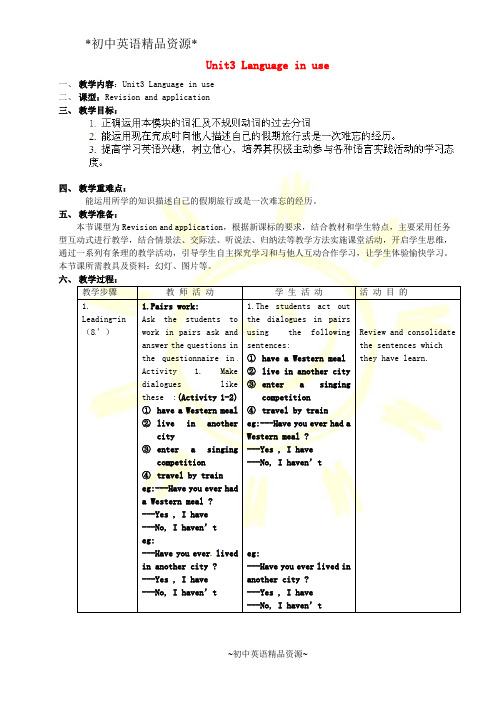
Unit3 Language in use一、教学内容:Unit3 Language in use二、课型:Revision and application三、教学目标:四、教学重难点:能运用所学的知识描述自己的假期旅行或是一次难忘的经历。
五、教学准备:本节课型为Revision and application,根据新课标的要求,结合教材和学生特点,主要采用任务型互动式进行教学,结合情景法、交际法、听说法、归纳法等教学方法实施课堂活动,开启学生思维,通过一系列有条理的教学活动,引导学生自主探究学习和与他人互动合作学习,让学生体验愉快学习。
本节课所需教具及资料:幻灯、图片等。
六、教学过程:教学步骤教师活动学生活动活动目的1. Leading-in (8’)1.Pairs work:Ask the students towork in pairs ask andanswer the questions inthe questionnaire inActivity 1. Makedialogues likethese :(Activity 1-2)①have a Western meal②live in anothercity③enter a singingcompetition④travel by traineg:---Have you ever hada Western meal ?---Yes , I have---No, I haven’teg:---Have you ever livedin another city ?---Yes , I have---No, I haven’t1.The students act outthe dialogues in pairsusing the followingsentences:①have a Western meal②live in another city③enter a singingcompetition④travel by traineg:---Have you ever had aWestern meal ?---Yes , I have---No, I haven’teg:---Have you ever lived inanother city ?---Yes , I have---No, I haven’tReview and consolidatethe sentences whichthey have learn.2.While-task( 20’)1. Ask the students todo Activity 3:Complete the sentencesabout your partner andread them to the rest ofthe class.①He/She______ aWestern meal ?②He/She ______ inanother city③He/She ______ asinging competition1. Complete the sentencesabout your partner andread them to the rest ofthe class.(Activity 3)①He/She______ a Westernmeal ?②He/She ______ inanother city③He/She ______a singingcompetitionReview and consolidatethe grammar andlanguage just learnedin the first two units.2.Let the students doActivity 4 and thencheck the answers.3. Let the students doActivity 5 and thencheck the answers.4.Listening:Do some listeningabout activity6-85.To read “Aroundthe world”, and thenanswer the questionsafter reading.Q: Have they finallyreached the top ofMount Qomolangma ?2. D o Activity 4,:Complete thepostcard .Use the list ofThings to do in Beijing tohelp you .3.Finish activity 5 .4.Listen and finishactivity 6-85.Read “Around theworld”, and answer thequestions after reading.Q: Have they finallyreached the top of MountQomolangma ?Review the PresentPerfect Tense(现在完成时)To practice the skillof listeningEnlarge the knowledgeabout the world.3. Post-task (10’)1.Ask students t o work ingroups(activity9-11)Go around the classroom and askother students yourquestions . Write theiranswers in the questionnaireTopi cs: TransportQuestions: Have you evertravelled by plane ?Student1_________________1Work in groupsAsk otherstudents yourquestions. Writetheir answers inthe questionnaireTopics: TransportQuestions:Student1_______Student2_______1.To practice the skillof speaking.2. Enable students totalk about theirexperiencesPractice the languageStudent2_________________ 2.Ask the students to act out their conversations . 3.Let students do some exercises and then check. 2.Act out your conversations 3. Do some exercises and then check.points. 4. Summary(1’)Ask the students to say out what to learn. Students conclude the knowledge that they learn. Let the students internalize the gram mar they’velearned in this module. 5. Homework (1’) Write a questionnaire about life experiences. Use the Present Perfect Tense.板书设计一、单项选择1.—Have you got any pieces of paper? —Yes, I _____.A. have gotB. haveC. hadone D. did2. Have you ever _____ to a foreigner?A. speakB. spokeC. spokenD. to speak 3. Have you met Mr. Li ______?A. justB. agoC. beforeD. a mom ent ago4. The famous writer _____ one new book in the past two years. A. is writing B. was writing C. wrote D. has writte n5. —Our country ______ a lot so far. —Yes. I hope it will be even ______.A. has changed; wellB. changed; goodC. has changed; betterD. changed; better 6. Zhao Lan ______already ______in this school fortwo years.A. was; studyingB. will; studyC. has; studiedD. are; studying7. We ______ Xiao Li since she was a little girl.A. knowB. had knownC. have knownD. knew8. Harry Potter is a very nice film. I_______ it twice.A. will seeB. have seenC. sawD. see9. —These farmers have been to the United States. —Really? When _____there?A. will they goB. did they goC. do they goD. have they gone10. His f ather ______ the Party (党) since 1978.A. joinedB. has joinedC. was inD. has beenin二、用所给动词的适当形式填空1. I _______ just __________ my homework. (finish)2. He __________ to school on foot every day. (go)3. ________ you ________ your science book yet? (find)4. Look! The monkey ________ the tree. (climb)5. My mother ________ to see me next Sunday. (come)6. —How many sheep _________ you __________? —Only one. (get)7. I’ve lost my pen. _______ you _________ it anywhere? (see)。
- 1、下载文档前请自行甄别文档内容的完整性,平台不提供额外的编辑、内容补充、找答案等附加服务。
- 2、"仅部分预览"的文档,不可在线预览部分如存在完整性等问题,可反馈申请退款(可完整预览的文档不适用该条件!)。
- 3、如文档侵犯您的权益,请联系客服反馈,我们会尽快为您处理(人工客服工作时间:9:00-18:30)。
go Ready?
Has Lingling ever ____ won (win) any pri 7. —____ zes? hasn’t (not). — No, she _______ has ____ sent (send) Peter to work in 8. And it ____ Germany, France and China before. 9. Mike and Clare ____ have also _____ begun (begin) to learn the language of the country, Arabic. 10. For example, in Egypt, they have _____ seen _____ (see) the Pyramids, travelled on a boat on the Nile River.
根据之前的例句,试着总结一下现在完成 时的各种句型:
人称 肯定句
I have done…
否定句
I have not (haven’t) done…
疑问句及回答
第一 人称
We have done…
Have you done…? Yes, I have. No, I have not (haven’t). We have not Have you done…? (haven’t) Yes, we have. done… No, we have not (haven’t).
Module 2 Experiences
Unit 3
Language in use
Objectives
1. To summarise and consolidate the use of the present perfect 2. To be able to carry out a survey using the present perfect
1. Have ____ you ever ____ won (win) any prizes before? 2. I ____ have never _______ travelled (travel) a lot. 3. They _____ ____ (be) to many is _______ wanted (want) to go on a 4. I ____ dream holiday. have _______ stopped (stop) trying now. 5. I ______ 6. I ____ have also ______ entered (enter) lots of speaking competitions, but haven’t won any prizes.
现在完成时 Present perfect tense
现在完成时经常表示在以前某个时间已经 发生的行为或曾经做过的事情对目前有某 种影响;还可以到目前为止已经完成的事 情。
I have seen the film. I do not want to see it again. 这部电影我已经看过了,不想再看了。 My aunt has travelled all over the world. 我姑姑已经周游了世界。
6. I’ve also entered lots of speaking competitions, but haven’t won any prizes. 7. — Has Lingling ever won any prizes? — No, she hasn’t. 8. And it has sent Peter to work in Germany, 句子谓语的共同特征: France and China before. has/have (not) + 动词的过去分词 9. Mike and Clare have also begun to learn the language of the country, Arabic. 10. For example, in Egypt, they have seen the Pyramids, travelled on a boat on the Nile River.
The following examples are from the texts of this module. Now let’s observe them carefully. 1. Have you ever won any prizes before? 2. I’ve never travelled a lot. 3. They have been to many interesting places. 4. I’ve always wanted to go on a dream holiday. 5. I’ve stopped trying now.
You have done…
人称
肯定句
He/She has done…
否定句
He/She has not (hasn’t) done…
疑问句及回答
Has he/she done…? Yes, he/she has. No, he/she has not (hasn’t).
第三 人称
They have They have Have they done…? done… not (haven’t) Yes, they have. done… No, they have not (haven’t).
人称
肯定句
You have done…
否定句
疑问句及回答
第二 人称
You have not Have you done…? (haven’t) Yes, I have. done… No, I have not (haven’t). You have not Have you done…? (haven’t) Yes, we have. done… No, we have not (haven’t).
